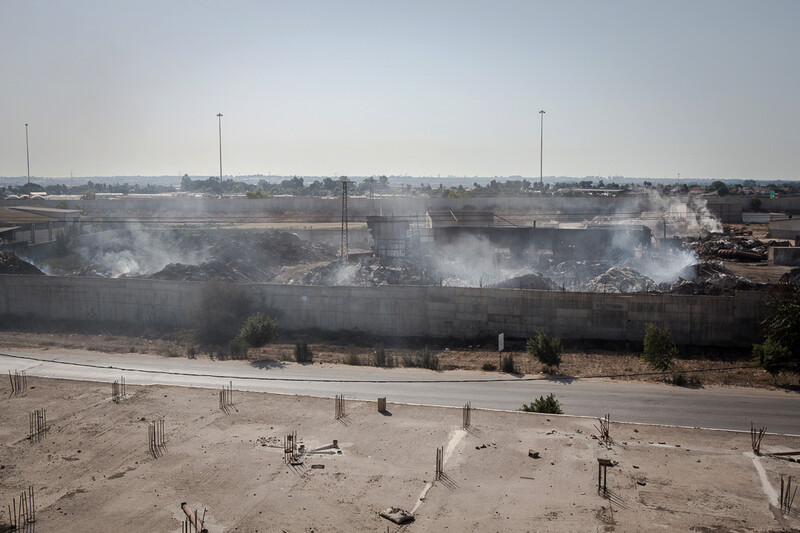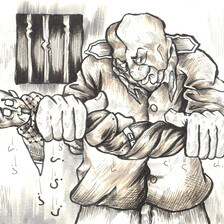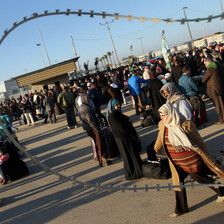The Electronic Intifada Tulkarem 17 September 2013

Smoke billows from an Israeli industrial park on 13 September, several days after a major fire.
Small flames were still burning and smoke was blowing into the downwind neighborhood ten days after a massive explosion in an illegal Israeli industrial area on the outskirts of the Palestinian city of Tulkarem in the occupied West Bank.
According to the Arabic-language al-Fajer TV News, the explosion took place around 11pm on Thursday, 5 September and the fire broke out at a nylon factory. Israeli occupation forces fired tear gas canisters on local youth that gathered at a junction near the factory.
Cell phone videos and photos captured by local residents show that flames ranged between 10 and 15 meters in height.
“They [Israeli firefighters] only put out the fire that was edging towards other Israeli factories,” Abdelhadi Salman, whose three-story home sits on the street in front of the factory, told The Electronic Intifada.
Gesturing to a completely charred and blackened plot of farmland in front of the factory, Salman said that the fire that had spread to Palestinian land was not extinguished until Palestinian firefighters were allowed to approach the scene much later.
“We would have died”
Eyad al-Jallad lives approximately 100 meters from the factory.
“When people came outside after hearing the explosion to see what was happening, soldiers attacked them with tear gas,” al-Jallad said. “With the smoke and the tear gas everywhere, we had to stay inside and seal the windows.”
Because Israeli soldiers were blocking the junction in front of their house, al-Jallad’s family was trapped inside. “If the fire had spread any further and caught my house on fire, we would have died,” he added.
The industrial area, known as Nitzanei Shalom, is located close to Israel’s wall in the West Bank and is built on confiscated Palestinian land. The 12 factories located there fall within Area C, the 60 percent of the West Bank that is under full Israeli control as a result of the Oslo accords signed by Israel and the Palestine Liberation Organization in the mid-1990s.
The first factories were moved to the area in the 1980s following public outcry against pollution in cities inside present-day Israel.
One of the factories is run by Geshuri Industries, a pesticides and fertilizer manufacturer that was originally located in Kfar Saba, a city in the Central District of Israel. That location closed as a result of a 1982 Israeli court order.
Another firm, Dixon Gas Company, moved to Tulkarem after being ordered to close its location in Netanya, a city in Israel some 15 kilometers away.
Constant pollution
Giving an example of the practices of the factories, al-Jallad said: “When they clean the gas pipes, they leave them open in our direction. Everyone here is suffering from these factories. This is not the first time there was a fire — it’s the third. But this one was the worst so far.”
“After these fires, no one comes to clean up,” al-Jallad added.
The constant pollution has also damaged local farmland, as documented on video by the Palestinian human rights organization Al-Haq.
“We used to be able to plant on our farmland three times a year, but now we are only able to do it once a year and we have to use unnatural amounts of fertilizers,” al-Jallad said. “Look at the land: it’s just dry dirt now. We can hardly use it.”
A report published in 2007 by a joint project between the Applied Research Institute of Jerusalem and the Land Research Center confirms that “the wastewater flowing from these factories is a major element contributing to the depletion of the fertile soil and plants.”
“Factories of death”
Another nearby resident, Suheil Salman, told The Electronic Intifada that “local businesses, landlords and farmers are struggling. The fumes and the waste from the factories are killing us. We call them ‘factories of death.’”
All of the local residents interviewed by The Electronic Intifada blamed the chemical factories for Tulkarem’s elevated cancer rates and other illnesses, most of which are respiratory conditions.
They also said that the factories are always closed for the day when the wind blows in the direction of the Israeli side of the West Bank wall.
A 2003 study conducted by An-Najah University in Nablus concludes that Tulkarem has the highest rates of lung cancer in the West Bank due to fumes from the industrial area. It states that the areas most affected by lung cancer were Jenin and Tulkarem (“Lung cancer and associated risk factors in the West Bank,” June 2003 [PDF]).
Despite both the suggestive evidence and the firm belief of residents that the chemical factories are taking a serious toll on the health of Palestinians in Tulkarem, there is little to no reliable research examining the relationship between pollution from the industrial zone and increased rates of cancer and other illnesses.
Suheil Salman said, “We all get respiratory inflammation, pneumonia, inflammation in our eyes. Most of the people who lived in the area moved out. Many people have been diagnosed with cancer in recent years.”
On the night of the fire, Fulla, who lives in a nearby neighborhood, had to close the windows and the air conditioner so that her family could sleep. “My brother has asthma … my mother had swollen and teary eyes, and my sister was coughing badly,” Fulla, who asked that her full name not be used, said.
“We’ve been suffering from these factories for as long as I can remember,” she said, adding that her father died of lung cancer in 2010. “The doctors used to always ask him if he lived near the Geshuri factories.”
Israel’s ongoing occupation has resulted in a slew of environmental abuses.
Ubiquitous military installations, illegal Jewish-only settlements and major corporations operating in East Jerusalem and the wider West Bank have left a permanent ecological footprint on the landscape by damaging and stealing Palestinian natural resources — primarily water and land. Israeli settlers regularly attack Palestinian farmers and set ablaze entire orchards of olive trees.
According to an audit conducted by Israel’s Ministry of Industry between 2006 and 2010, in the West Bank there approximately 20 industrial zones under Israeli administration. Regarding these industrial zones, the state comptroller noted a “continued failure for years of the lack of substantial supervision and enforcement in the field of safety and hygiene in Israeli factories in Judea and Samaria [the occupied West Bank], which has to point to ongoing disregard for human life.”
“Your problem — you deal with it”
“Successive Israeli governments have provided incentives to Israeli businesses to start operations beyond the Green Line,” Shawan Jabarin, director of Al-Haq, told The Electronic Intifada, referring to the armistice line marking the boundary between Israel and the occupied West Bank.
“Such incentives may include financial benefits such as tax cuts and subsidized water,” Jabarin added. “Although Israel has extended its civil laws and jurisdiction to all settlements … rarely are they held accountable for violations of the obligations incumbent on them.”
Palestinian laborers who work in Israeli businesses in the West Bank are not entitled to minimum wage or permitted membership in Hisdarut, Israel’s official labor union — although they are obliged to pay membership dues.
Tulkarem’s chemical factories are no exception. Corporate Occupation, a project that tracks corporate complicity in Israel’s occupation, published an interview with two Palestinian workers from Nitzanei Shalom in 2010. Ahmad and Rashid stated that Palestinian trade unions have not been allowed access to the area since 2008 (“The buds of peace?”).
Between 2002 and 2008, Rashid told Corporate Occupation, “three workers have died — in 2000, 2002 and 2008 from burns sustained from gas-related fires at the factory.”
According to Al-Haq’s Jabarin, “International law clearly prohibits Israel, as an occupying power, from appropriating land located in the West Bank. Israel is also prohibited from constructing infrastructure that primarily benefits its own economy.”
Jabarin also added that Israel is obligated to protect the health and safety of Palestinians and to ensure “the right of everyone to an adequate standard of living.”
Yet several attempts to challenge the chemical factories have so far proved fruitless.
“Whenever we try to have the factories closed down, the answer is always the same: [the pollution] is only on Palestinian land — your problem, you deal with it,” said Fulla.
“We’ve taken the issue to the [Israeli] courts, we’ve had demonstrations, we’ve tried to raise awareness. There’s no hope because they think Palestinian lives are worth less than theirs.”
Patrick O. Strickland is an investigative journalist for Mint Press News. His articles have appeared at Al Jazeera English, Truthout and The Electronic Intifada. Follow him on Twitter: @P_Strickland_.




